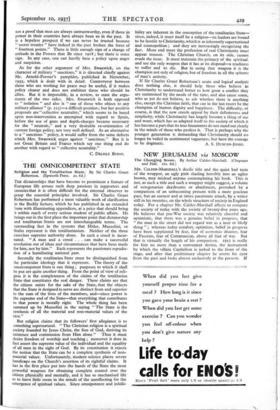THE OMNICOMPETENT STATE
Religion and the Totalitarian State. By Sir Charles Grant Robertson. (Epworth Press. 2s. Ed.) THE dictatorships that have become so prominent a feature of European life arouse such deep passions in supporters and enemies that it is often difficult for the external observer to grasp the essential principles involved. Sir Charles Grant Robertson has performed a most valuable work of clarification in the Beckly lecture, which he has published in an extended form with illuminating appendices, at a price that should bring it within reach of every serious student of public affairs. He brings out in the first place the important point that dictatorship and totalitarian States are not interchangeable terms. The outstanding fact in the systems that Hider, Mussolini, or Stalin represent is this totalitarianism. Neither of the three exercises supreme authority alone. In each a creed is incar- nated. "A man and a creed . . . can make a successful revolution out of ideas and circumstances that have been made for him, not by him." Each represents the passionate repudia- tion of a humiliating national past.
Secondly the totalitarian State must be distinguished from the particular ideology that it expresses. The theory of the amnicompetent State is one thing ; purposes to which it shall be put are quite another thing. From the point of view of reli- gion it is the completeness of the claims of the totalitarian State that constitutes the real danger. These claims are that the citizen exists for the sake of the State, that the objects that the State is designed to serve are distinct from and superior to the sum of the lives of the members, and—since power is the supreme end of the State—that everything that contributes to that power is morally right. The whole thing has been surruned up by Mussolini in the saying "The State is the synthesis of all the material and non-material values of the race."
But religion claims that its followers' first allegiance is to ;omething supernatural. "The Christian religion is a spiritual society founded by Jesus Christ, the Son of God, deriving its existence and commission from Him alone." Thus it must desire freedom of worship and teaching ; moreover it does in fact assert the supreme value of the individual and the equality of all men in the sight of God. By its constitution it rejects the notion that the State can be a complete synthesis of non- material values. Unfortunately, modern science places severe handicaps on the Church's assertion of its rightful claims. It has in the first place put into the hands of the State the most powerful weapons for obtaining complete control over the citizen physically and mentally, and it has so mechanised life as to leave little room in the minds of the unreflecting for the emergence of spiritual values. Since omnipotence and infalli-
bility are inherent in the conception of the totalitarian State— since, indeed, it must itself be a religion—its leaders are bound to be hostile to Christianity, which is as inherently supernational and cosmopolitan ; and they are increasingly recognising the fact. More and more the profession of real Christianity must appear treason. The Christian Church, on its side, cannot evade the issue. It must maintain the primacy of the spiritual, and use the only weapon that it has at its disposal—a readiness to suffer and to die. But in using that weapon it is the champion not only of religion, but of freedom in all the spheres of man's activity.
If Sir Charles Grant Robertson's acute and logical analysis does nothing else, it should help those who believe in Christianity to understand better to how great a conflict they are summoned by the needs of the time, and also cause some, who as yet do not believe, to ask whether there is anything else, except the Christian faith, that can in the last resort be the champion of human dignity and happiness. The difficulty, of course, is that the new creeds appeal by their definiteness and simplicity, while Christianity has largely become a thing of use and wont, which has so adapted itself to the society of which it has become a part that its true lineaments do not stand out clearly in the minds of those who profess it. That is perhaps why the younger generation is demanding that Christianity should no longer be veiled in sentimental vagueness, but have the courage










































 Previous page
Previous page